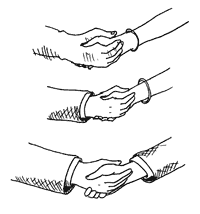STRANGE BUT TRUE- Shake on it: How many degrees from FDR?

DRAWING BY DEBORAH DERR McCLINTOCK
Q. Ever shake the hand of someone who shook the hand of someone... who shook FDR's hand? –J.E. Hoover
A. U.S. President Franklin Delano Roosevelt no doubt shook hands with all the members of Congress at the time, governors of the states, military leaders, and prominent players in governments around the world, as well as thousands of ordinary citizens, say Edward Burger and Michael Starbird in Coincidences, Chaos, and All That Math Jazz. And all these people in turn shook hands with other politicians, activists, religious leaders, who shook hands with their families, neighbors, parishioners, co-workers. By now, essentially everyone has been indirectly touched by FDR.
Perhaps you'd rather estimate your "degree of handshake separation" from actor Kevin Bacon (or Marilyn Monroe or Elvis). Begin by thinking of the most famous person you've shaken hands with and follow the chain. Famous people in general either have shaken hands with each other or are within one shake of doing so. So it's likely it'll take only three jumps to get you to any famous person and another three to get you to just about anyone, though "it might take a few more shakes to reach a farmer who lives in a remote region in China."
Q. You pretty much know how your health was yesterday and probably for today. But what about tomorrow? How much might you be able to predict and how much might you want to? –J.D. Aller
A. A full-body CT scan (a sophisticated X-ray) can pick up early signs of cancer, heart disease, aneurysm, osteoporosis, kidney stones, gallstones and more, says Graham Lawton in New Scientist. It might even turn up a real surprise, such as "situs inversus," a benign condition where your internal organs are the wrong way round–heart on the right, liver on the left, etc– making you a scientific curiosity at 1 in every 8500 people.
A host of other tests can tell your total body fat and bone density, cholesterol level and organ functions, as well as detect diseases from diabetes and gout to arthritis and cystitis. Some companies even sell home test kits to gauge women's "ovarian reserves," i.e., how many good quality eggs they have left. Genetic tests will increasingly be able to identify diseases likely to strike your later in life. The ultimate in medical crystal ball gazing has to be scientific prediction of when you will die, says Lawton. For this, Boston University has designed a questionnaire based on the latest gerontology (livingto100.com). "Take it if you dare."
Q. How many heartbeats for you in your lifetime– lub-dubbing all the way? How do we humans steal a few extra, or a few extra hundred million? –A. Taylor
A. Your tireless ticker will beat a few hundred times as you read this, roughly 70 per minute, 100,000 per day,
36,000,000 in a year. If that's a scary figure, we humans are allotted some 2,500,000,000 (2.5 billion) for our 75 years or so. The biological "theft" here is that other mammals, from small fast-hearted mice to big slow-hearted elephants, are gifted with only about 800,000,000 beats.
So why the beat bonanza for us? "Neoteny" may be the answer, our long gestation and childhood, slowness to come to maturity and retention of juvenile features (such as playfulness) well into adulthood, writes Stephen Jay Gould in The Panda's Thumb.
For your own "heart odometer" reading, log on to Aetna's intelihealth.com, search on odometer, and type in your birth date for the heartening tally.
Q. Tired of your kid's wild antics, you decide to nickname him "Frankenstein" after the classic monster of Mary Shelley's 1818 Gothic novel. "Dad, that would be a monstrous mistake," he responds. Why is he right? –E. Deis
A. Because the monster created by Baron Frankenstein in the story was actually nameless, says Mark Davidson in Right, Wrong, and Risky. That confusion of the invention/inventor was so common by the 1920s that Fowler's Dictionary of Modern English Usage called it "almost, but surely not quite, sanctioned by custom." By 1996, New Fowler's Modern English Usage declared that "This use is so widespread and so embedded in the language now that it looks unlikely to be dislodged."
Likewise, the phrase "a Frankenstein" is now widely used to identify an invention that threatens to destroy its creator. On this, editor Erik Wensberg (Wilson Follett's Modern American Usage) ruled that "a Frankenstein" is as "legitimate" as "a Ford." But, dissents Davidson, Baron Frankenstein never sold Frankensteins, and Professor J. N. Hook in his Appropriate Word recommends that you "avoid risk of ridicule by (instead) saying 'a Frankenstein monster.'"
Send Strange questions to brothers Bill and Rich at [email protected].
#